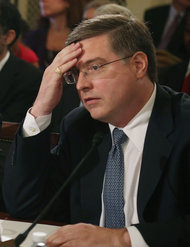 Mark Wilson/Getty ImagesRobert W. Cook, the S.E.C.’s director of trading and markets, at a Senate panel earlier this year.
Mark Wilson/Getty ImagesRobert W. Cook, the S.E.C.’s director of trading and markets, at a Senate panel earlier this year.
The exodus at the Securities and Exchange Commission is continuing.
Two top S.E.C. officials — Mark D. Cahn, the general counsel, and Robert W. Cook, the director of trading and markets — plan to leave, the agency said on Wednesday. The two join Meredith Cross, the S.E.C’s director of corporate finance, whose departure was announced on Tuesday.
The departures come after Mary L. Schapiro announced her resignation as chairwoman last week, after four years leading the agency. Elisse B. Walter, a Democratic commissioner at the agency, will take the reins, but her successor is expected to be named in the near future.
Revolving Door
View all posts
Under Mr. Cahn’s watch, the S.E.C. developed a program to reward whistle-blowers who provided useful information. Mr. Cahn, who has served in his position since February 2011, also advised on the rules that the agency had to write under the Dodd-Frank Act. He plans to leave at the end of the year and return to the private sector.
Mr. Cook, who has been the director of trading and markets since January 2010, oversaw the new rules for Wall Street stemming from Dodd-Frank and the JOBS Act. He also directed the agency’s response to the “flash crash” of May 6, 2010, leading an effort to strengthen circuit breakers and other controls.
“Robert provided extraordinary counsel and worked tirelessly as we put in place measures that have helped to bolster our markets,” Ms. Schapiro said in a statement.
Additional departures may follow after a new leader is named. Robert Khuzami, the S.E.C. enforcement director, is considered a long-shot contender to take over from Ms. Walter as chairman. Some agency officials expect him to leave if he is not named to the top post, according to people with knowledge of the matter who spoke on the condition of anonymity.
The personnel changes come as the agency has regained some of its footing since the financial crisis, but is still enmeshed in its share of battles. While the S.E.C. has claimed some significant enforcement victories over the last few years, it is still criticized by consumer advocates as not being tough enough on Wall Street.
It also has plenty of work to do, as it completes new regulations and considers fresh challenges, like how to police the high-speed trading that dominates the stock market.
“It has been a unique privilege to have worked at the commission during such an extraordinary period of change in the financial and regulatory arena,” Mr. Cahn, the general counsel, said in a statement.
Ben Protess contributed reporting.
Article source: http://dealbook.nytimes.com/2012/12/05/2-more-officials-plan-to-leave-the-s-e-c/?partner=rss&emc=rss
